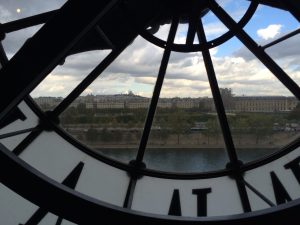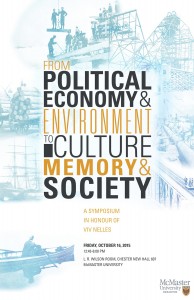The Journal of Global History has just released my new article written with Julie Cohn and Marc Landry, “Water powers: the Second World War and the mobilization of hydroelectricity in Canada, the United States and Germany”. The paper originated in a session at the American Society for Environmental History when Julie, Marc and I presented stand alone papers, each tackling a different country but with similar questions. The striking parallels and differences led us to dive more deeply into the comparisons. The resulting paper throws fresh light on each case and argues for the significance of hydro power to the war and of the war to the evolution of electrical systems.
Category Archives: Uncategorized
New Article: Debating water purity and expertise
My article on Vancouver’s chlorination controversy during the Second World War has now been published online on the Journal of Historical Geography website. “Debating water purity and expertise: the chlorination controversy in Vancouver during the Second World War” examines how chlorination was imposed on Vancouver by the federal government as a war measure and how local authorities resisted and sought to defend what they saw as the water’s purity. The debate provoked wide public interest as well as amazing claims about water testing, the insufferable advice of experts and the outrageous authority of Ottawa in Vancouver’s local affairs. At the end of the war, chlorination equipment was unplugged, and local power reasserted. Chlorination returned in the late 1940s with less notice, but the chlorination controversy arguably laid the terms for subsequent fights over whether or not to fluoridate Vancouver’s water supply (spoiler: it never happened).
CHESS 2019: Call for Participants
Gold Mountain River: Chinese Mining Landscapes in Indigenous Territories
June 5 – June 7, 2019
**Deadline for Applications: December 15, 2018**
The Network in Canadian History and Environment is pleased to invite applications for the 2019 Canadian History and Environment Summer School (CHESS) in Vancouver, British Columbia. CHESS is an annual event that brings together graduate students, faculty, and other researchers in the fields of environmental history and historical geography for two and a half days of field trips, workshops, public lectures, and more.
This year, CHESS will explore the cultural landscapes of the Fraser River’s nineteenth-century gold fields. In the mid-nineteenth century, the discovery of gold near present-day Lytton unleashed a series of social, economic, and environmental changes that reverberated through the upper canyons of the Fraser. In 1858, more than 20,000 miners traveled up the river, where they staked claims and developed placer mining sites in their search for gold. While most of the miners came from California and eastern North America, many came from China, and their labour, extractive activities, and interactions with Indigenous peoples remain understudied aspects of Canada’s social and environmental history.

Photo source: “Unidentified man washing gold in the Fraser River, British Columbia, circa 1875.” Library and Archives Canada, Mikan 3192437
To engage with the environmental and historical legacies of the Fraser River Gold Rush, the local organizing committee has scheduled a two-day rafting expedition between Lillooet and Lytton on the Fraser River. During this trip, participants will visit Browning’s Flat and Rip Van Winkle, which represent some of the best-preserved examples of Chinese placer mining activity around the Pacific. At these and other sites, participants will encounter historical traces of the environmental changes people wrought through placer mining, and learn how interactions among Chinese miners and the Nlaka’pamux and St’át’imc peoples shaped social and environmental relations along the Fraser River during and after the 1858 gold rush. To understand how these sites are embedded within broader cultural landscapes, participants will consider the imperial networks and colonial histories that brought thousands of miners to the traditional territories of the Nlaka’pamux and St’át’imc Nations in the mid-nineteenth century.
Participant spaces are limited as the field school will involve two nights of camping at sites along the Fraser River. Camping gear will be supplied by a local outfitter. To apply to attend, please complete the online form at the link below with a brief statement explaining your interest in CHESS 2019, how your research aligns with this year’s theme, and a one-page CV.
Graduate students are encouraged to apply, and funding is being sought for their support.
For questions, please contact the organizers at chess.2019@ubc.ca.
Organizing committee: Matthew Evenden, Tina Loo, and Jonathan Luedee
Beyond the Organic Machine?
My new article on river history has been published in Environmental History. Entitled, “Beyond the Organic Machine? New Approaches in River Historiography,” the paper reflects on the changing nature of river histories since the 1990s, and the rise of urban and international river hist ories.
ories.
A New Introduction to Harold Innis’ Essays in Economic History
This March, the University of Toronto Press will re-publish Harold Innis’ Essays in Canadian Economic History, which was published posthumously in 1956. I have written a new introduction to the volume, seeking to provide some background on the author and how the book collection came to be. I also reflect on the changing interest in and readings of Innis across the social sciences from the 1950’s forward.

Jonathan Peyton’s Unbuilt Environments
I’m delighted to see that Jonathan Peyton‘s Unbuilt Environments: Tracing Postwar Development in Northwest British Columbia will appear this fall in the UBC Press Nature/History/Society Series. Peyton completed his PhD at UBC Geography in 2011 and is currently Assistant Professor of Geography at the University of Manitoba. Peyton and I also have a joint-authored paper on the history of hydro-electricity in Canada appearing in Ruth Sandwell (ed), Powering Up Canada: The History of Power, Fuel and Energy in Canada, 1600 to the Present (MQUP 2016)

From Political Economy & Environment to Culture, Memory & Society
 Announcing: From Political Economy and Environment to Culture, Memory and Society: A symposium in honour of Viv Nelles
Announcing: From Political Economy and Environment to Culture, Memory and Society: A symposium in honour of Viv Nelles
Friday, October 16, 2015, 12:45- 6:00 pm
Location: L. R. Wilson Room, Chester New Hall 607, McMaster University
This event recognizes and celebrates the career contributions and scholarship of Viv Nelles, outgoing L.R. Wilson Chair in Canadian History, with a series of papers presented by his former PhD students and invited guests, including: Stéphane Castonguay, Matthew Evenden, Sarah Glassford, Ken Cruikshank, Sean Kheraj, Colin McMahon, Laurence Mussio, and Liza Piper. In addition to paper presentations, the symposium concludes with an easy walk in Cootes Paradise (weather permitting). Please dress accordingly.
The event is open to the public, but RSVP’s to Ken Cruikshank, cruiksha@mcmaster.ca, would be appreciated.
My new book: watch the Allied Power trailer
Thanks to Jessica Hallenback, who shot the film.
Allied Power: Mobilizing Hydro-Electricity during Canada’s Second World War (Toronto: UTP, 2015)
McLean lectures now available
Would you like to see Tina Loo’s 2015 McLean lectures in Canadian Studies, “Moved by the State: Forced Relocation and a ‘Good Life’ in Postwar Canada”? Links for the videos and podcasts can be accessed on the UBC Canadian Studies website: http://www.canadianstudies.ubc.ca/ Enjoy!
Announcing 2015 McLean Lectures in Canadian Studies @ UBC by Tina Loo
Your invited to the 2015 McLean Lectures in Canadian Studies presented by Professor Tina Loo, “Moved by the State: Forced Relocation and a ‘Good Life’ in Postwar Canada.” The lectures explore the relationships among poverty, development, and democracy in Canada.
28 January “Hell and Hope in the Barrenlands,” on forced relocation in the central Arctic
4 February “Developing a ‘Good Life’ in Newfoundland and Eastern Quebec”
11 February “Building Better Cities East and West”
Location: Liu Centre Multipurpose Room. Lectures start @ 7 pm
Bob Brooks, “A house being moved by floating in from Silver Fox Island, Bonavista Bay, to Dover, Newfoundland,” 1961. Library and Archives Canada, e010975945

